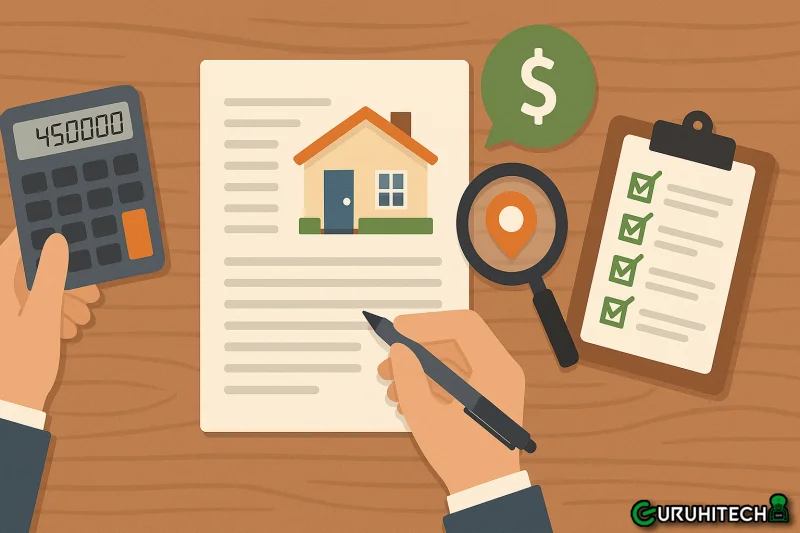What Are the Best Strategies for Evaluating a Property?

Looking to master property evaluation? Dive into tried and tested methods to compare properties, scrutinize locations, and assess conditions.
Financial analysis, including NOI and Cap Rate calculations, helps gauge investment returns accurately. Risk assessment and market analysis offer insights into challenges and trends.
Understanding location significance and legal compliance are crucial. Equip yourself with knowledge and tools to navigate property evaluation intricacies for successful investments.
Property Comparison and Market Analysis
Here are some helpful investment property tips: When evaluating a property, prioritizing property comparison and market analysis is crucial for making informed decisions. Understanding what to look for in an investment property is key. You should assess comparable properties, considering factors like size, bedrooms, condition, and price per square foot.
By conducting a thorough market analysis, you can gauge the property’s potential in the local market. Look for amenities that appeal to potential renters, such as schools and transportation options. Evaluating the investment property’s location can help you determine its attractiveness to the target market.
Location Evaluation and Appeal Assessment
To effectively learn how to evaluate an investment, you must prioritize location evaluation and appeal assessment. The property’s location plays a crucial role in its attractiveness and market value. Consider the proximity to amenities such as schools, hospitals, and transportation hubs. Evaluate the neighborhood’s safety, crime rates, and potential for future development.
Accessibility to public transportation can enhance the property’s appeal to renters or buyers. Additionally, assess the area’s overall desirability and potential for property value appreciation. Transforming unattractive locations into desirable ones can significantly impact the property’s market appeal.
Infrastructure and Property Condition Assessment
Prioritize assessing the infrastructure and overall condition of the property to make informed decisions regarding its potential and investment returns.
Start by inspecting the property’s foundation, roof, HVAC systems, plumbing, and electrical setups. Identify any structural issues, leaks, or signs of wear and tear. Consider hiring professionals to conduct a thorough inspection for a detailed evaluation. Understanding the property’s current state will help estimate future maintenance costs and potential value appreciation.
Additionally, assess the property’s curb appeal, interior condition, and overall functionality. A well-maintained property can attract higher rental rates and increase tenant satisfaction, leading to better investment returns.
Financial Analysis and Investment Considerations
Consider evaluating a property’s financial viability through a thorough analysis of its potential returns and investment considerations.
Start by calculating the Net Operating Income (NOI) and Cap Rate to understand the property’s profitability. Determine the NOI by subtracting expenses from the total income, and use the Cap Rate to assess the return on investment.
Factor in rental rates, expected income, purchase price, property taxes, insurance costs, and renovation expenses. Evaluate financing options and interest rates to determine the overall financial impact.
Assess potential risks such as market fluctuations, unexpected expenses, and regulatory changes. By conducting a comprehensive financial analysis, you can make informed decisions regarding the property’s investment potential and long-term financial gains.
Risk Assessment and Regulatory Compliance
Assessing property risks and ensuring regulatory compliance are crucial steps in property evaluation. When evaluating risks, consider potential hazards like natural disasters, market fluctuations, and unexpected expenses. Conduct thorough inspections to identify possible issues that could impact the property’s value or safety.
Additionally, regulatory compliance is essential to avoid legal complications that could affect your investment. Stay informed about zoning laws, building codes, and environmental regulations to ensure the property meets all necessary standards.
Conclusion
In conclusion, mastering the art of property evaluation requires a combination of strategic analysis and thorough assessment.
By comparing properties, scrutinizing locations, assessing conditions, analyzing financial aspects, and considering risks, you can make informed investment decisions. Understanding market trends, legal compliance, and property appeal are crucial for successful evaluations.
With the right knowledge and tools, you can navigate the complexities of property evaluation and achieve successful outcomes in the real estate market.
Ti potrebbe interessare:
Segui guruhitech su:
- Google News: bit.ly/gurugooglenews
- Telegram: t.me/guruhitech
- X (Twitter): x.com/guruhitech1
- Bluesky: bsky.app/profile/guruhitech.bsky.social
- GETTR: gettr.com/user/guruhitech
- Rumble: rumble.com/user/guruhitech
- VKontakte: vk.com/guruhitech
- MeWe: mewe.com/i/guruhitech
- Skype: live:.cid.d4cf3836b772da8a
- WhatsApp: bit.ly/whatsappguruhitech
Esprimi il tuo parere!
Che ne pensi di questa notizia? Lascia un commento nell’apposita sezione che trovi più in basso e se ti va, iscriviti alla newsletter.
Per qualsiasi domanda, informazione o assistenza nel mondo della tecnologia, puoi inviare una email all’indirizzo [email protected].
Scopri di più da GuruHiTech
Abbonati per ricevere gli ultimi articoli inviati alla tua e-mail.
